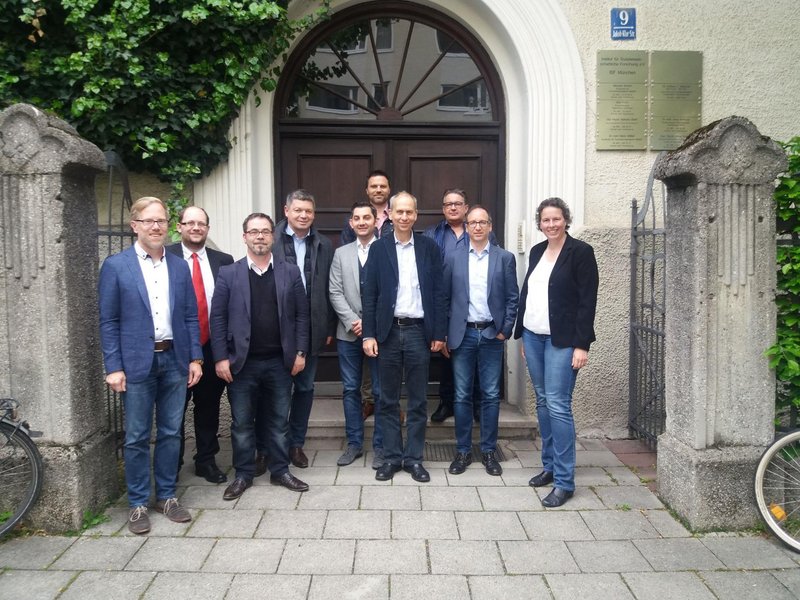Getting a car off the production line is a long process. This is partly because it requires complex, cross-company collaboration between manufacturing firms, automotive suppliers and their component suppliers. That is why, as part of individual customer requirements, project management tools such as digital networks have long been playing an important role. The prerequisites that need to be in place for such collaboration to be successful over the longer term, however, are still open, along with those for designing new forms of working together that boost efficiency and focus. This is where the new research project HyValue – hybridisation in the value chain: from system supplier to collaboration expert comes in. Based on the example of the development process for a car, the aim of the project is to design a concept for ‘collaborative service work’ that coordinates the development and production processes between different stakeholders, and which makes collaboration between companies faster, more efficient and more transparent. For this purpose, Landshut University of Applied Sciences is developing and testing an interactive, adaptive collaboration platform in conjunction with the Munich-based Institute for Social Science Research (ISF), the automotive suppliers Dräxlmaier and Honasco, an IT company called collaboration Factory and automotive manufacturers. The project will run until 2022 and is being funded by the German Federal Ministry of Education and Research (BMBF) to the tune of over two million euros as part of the Future of Work programme.
Collaboration in real time
“Essentially, we are developing a shared virtual desk for everyone involved in the value creation process,” explains Prof. Holger Timinger who is responsible for the management of the project at Landshut University of Applied Sciences. “Our initial question is: How can cross-company collaboration be better designed using modern media?” To date, there has often been a dog-eat-dog mentality between companies which is extremely counter-productive. With the help of the shared platform it could be possible for the parties involved to improve their collaboration and to increase their competitiveness. In terms of implementation, it means that in order to enable employees to collaborate at all levels involved, the researchers are integrating the experiences and requirements of users into this platform, working on rules for collaboration and combining the different ways of working. Cloud-based software is also being developed to use the virtual project spaces. This will enable new forms of working to take shape, including collaboration in real time, making it considerably easier for those involved to work together. “It is about identifying errors early on in the process of creating the product and in partnership and avoiding having to correct them later in additional steps and at great expense by means of contractual arrangements,” says Timinger, describing one of the benefits of the concept.
Benefits for business, teaching and science
As well as the automotive industry, other industries with similarly complex value creation processes could benefit from the findings at the end of the project, for example mechanical engineering, the electronics sector or medical technology. Furthermore, the findings are to feed directly into teaching and opportunities for further training at the university, as well as into the INDIGO (Internet und Digitalisierung Ostbayern (Internet and Digitalisation in East Bavaria)) scientific network.
About the project
The HyValue project (Hybridisation in the value chain: from system supplier to collaboration expert) is set to run until March 2022 and is being carried out in Landshut at the Institute for Project Management and Information Modelling (IPIM). The project manager at Landshut University of Applied Sciences is Prof. Holger Timinger, with the project being managed overall by the Munich-based Institute for Social Science Research. The companies Dräxlmaier, Honasco and collaboration Factory are other project partners. BMW and Porsche are associate partners. The project is being financed by the German Federal Ministry of Education and Research and co-financed by the European Social Fund. The total amount of funding exceeds two million euros.
Project partners: | Institute for Social Science Research (ISF), Munich Institute for Project Management and Information Modelling (IPIM), Landshut University of Applied Sciences Lisa Dräxlmaier GmbH Honasco Kunststofftechnik GmbH & Co.KG collaboration Factory AG |
Associate partners: | BMW AG Porsche AG |
Overall project management: | Dr. Eckhard Heidling, Institute for Social Science Research (ISF), Munich |
Project management at Landshut University of Applied Sciences: | Prof. Holger Timinger |
Funding amount for Landshut University of Applied Sciences: | 286,374 euros |
Programme: | Future of Work |
Total project funding: | Over 2 million euros |
Funding: | German Federal Ministry of Education and Research (BMBF) Co-financed by the European Social Fund (ESF) |
Photo: Landshut University of Applied Sciences
(free to use if source cited)

